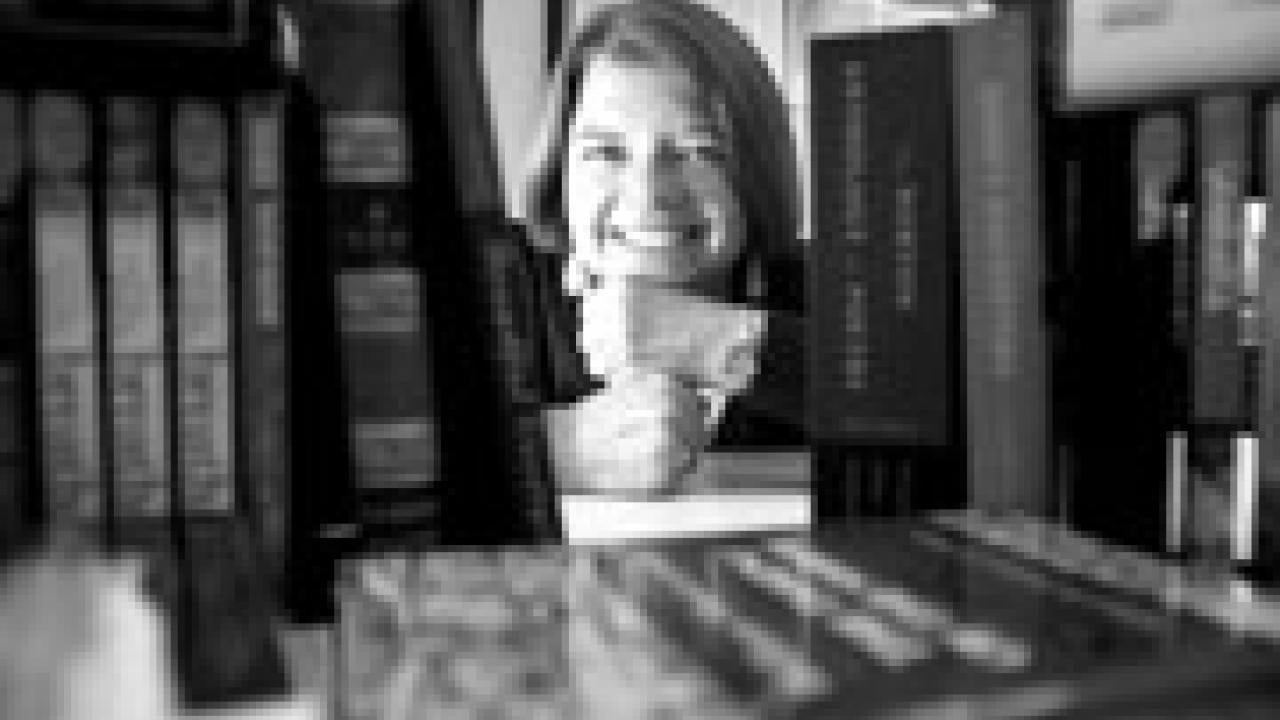The rest of the campus may not have noticed, but the ground has shifted under Voorhies Hall, making seismic changes in the UC Davis Department of English.
Department Chair Margaret Ferguson gives full credit to a group of visionaries who have transformed the UC Davis department in the past decade. But Ferguson's work is far from done, as she has called on her department to begin rethinking what English majors should be reading and learning.
Due to an aging faculty and a state budget crisis in the early 1990s, a wave of retirements in the past decade created a crisis — but also an opportunity. As a result, nearly two-thirds of the current English faculty has been hired in the past nine years.
Today, nearly half of the 38 faculty members are women, and since the larger recruitment effort was launched in the mid-'90s, the department has made a major effort to hire African-American, Asian-American and Latino faculty members.
"As I'm watching my older faculty colleagues step gallantly up to many plates this fall — from mentoring to running prelims to serving on many extra committees," Ferguson said, "I'm thinking if it weren't for them being open to new ideas — and new conceptions of the field — we wouldn't have been able to hire so harmoniously."
One of these colleagues, English professor Karl Zender, helped transform the department while he was chair from 1993-1998. He said the new faculty reflects a changing sensibility in the discipline.
"Until 1990, the assumption was that English literature was defined in national and Eurocentric terms — American white male authors or British white male authors," he said. But today's faculty is studying and teaching subjects that span a broad definition of "literature." Think Arthur Miller plays, lesbian critiques of marriage in literature, early silent American film — and comic books.
And the authors being studied? They span the English-writing globe — India, Pakistan, South Africa, Australia, New Zealand, Canada and the Caribbean, not to mention Great Britain and the United States.
These days, according to Ferguson, the English department boasts a happy if eclectic gathering of professors with a reputation for enjoying students and teaching.
"We've hired strong people — most with prestigious degrees from top universities," said Ferguson, who took over as department chair this summer.
The most recent hires include John Marx, a professor from the University of Richmond who earned his doctorate from Brown and studies the modernist novel; Colin Milburn, fresh from Harvard graduate school with his eye on technology and science in comic books; new Harvard grad Mark Jerng, who focuses on Asian-American literature and culture; and Christopher Thaiss, a senior faculty member specializing in writing across the disciplines from George Mason University. Thaiss has a joint appointment with the University Writing Program, where he is the new director.
Ferguson, who has held faculty positions at Yale, Columbia and the University of Colorado, believes it is a privilege to be teaching at the University of California. She sees a parallel between the expanding horizons of the English discipline and the very students who fill her classes in early-modern women writers.
"I love the public university," Ferguson said. "Here we benefit by teaching in an exciting place with a student body that is ethnically and economically diverse."
Although it is a "service department" with between 25 percent and 50 percent of its upper division classes being filled with non-majors, the English department claims the most number of majors in the Division of Humanities, Arts and Cultural Studies. In fact, across all of the disciplines on campus, English ranks as the eighth largest major.
Last year, the university counted 655 English majors, and this year the number may rise to 750, according to Lynda Jones, the undergraduate student affairs officer in English.
What all of these English majors are learning is currently on the mind of the faculty. Ferguson has asked English professor Frances Dolan to head a committee to rethink what English majors should be learning.
Dolan said it will be a big job but one she is eager to tackle — with help. "This is a chance for our faculty to think collectively about what we teach, how we teach it and why it matters."
Students interested in English need not worry that they will be missing out on the classical standards found in the traditional English canon, says Dolan, herself a Shakespeare scholar.
"In addition to expanding the range of works we read in every period, we are also reading everything, even the most revered and beloved texts, with new eyes," she said, pointing to recent attention to depictions of global trade and Islam on the Shakespearean stage.
"When we ask new questions, we see the past in fresh ways," Dolan said. "This also makes it possible to help students understand why the past might interest and instruct them."
Zender, who has taught and studied at UC Davis since 1973, has had his share of queries as to the relevance of studying English literature.
"Literary studies doesn't 'progress' in the same way that the sciences do," he said. "So, if we don't progress — what do we do? We interpret a changing culture to itself. In the end, studying literature is studying moral choices."
Media Resources
Susanne Rockwell, Web and new media editor, (530) 752-2542, sgrockwell@ucdavis.edu
